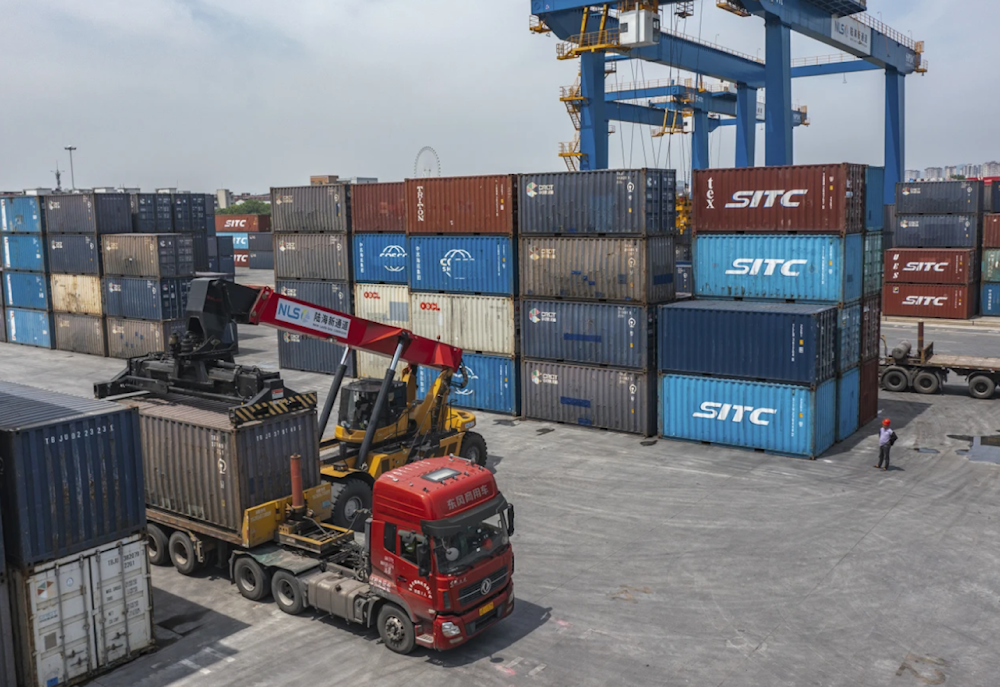In first, China exports more to Vietnam than Japan
The rerouting of trade risks increased prices for businesses and consumers, but it has helped Vietnam, which has witnessed an increase in investment as companies seek to diversify their supply chains away from China.
-

In this photo released by Xinhua News, a truck transfers a container at the Tuanjiecun Station in the Chongqing International Logistics Hub Park in southwest China's Chongqing Municipality on May 5, 2024. (AP)
Vietnam has surpassed Japan as China's third-largest export destination for the first time, as US tariffs compel businesses to find new suppliers to avoid taxes while continuing to rely on Chinese manufacturers for components.
China's exports to Vietnam increased by over 18% in 2024 to a record $162 billion, according to figures provided by China's customs office on Monday. This broke the previous record of $152 billion in sales to Japan, China's third-largest export market.
The increase was mostly driven by an increase in part shipments to the Southeast Asian country, where they are assembled before being shipped to the US and other destinations. According to Chinese data through November 2024, electronic components such as screen modules and computer memory accounted for eight of the top 10 fastest-growing exports.
The rerouting of trade risks boosting prices for businesses and consumers, but it has helped Vietnam, which has witnessed an increase in investment as companies seek to diversify their supply chains away from China. Leading electronics manufacturers, including Samsung Electronics Co., Luxshare Precision Industry Co., and Hon Hai Precision Industry Co., have spent billions of dollars in Vietnam in recent years to assemble items like AirPods and MacBooks.
The AI boom and US export limitations on AI chips have both increased investment in Vietnam and kept China in the game.
Hon Hai began manufacturing Nvidia’s AI graphics cards at a subsidiary in Vietnam last year, sourcing critical components like integrated circuits and printed circuit boards from China, according to NBD, a private customs data provider.
Most of the finished products were shipped to US clients, contributing to a record trade surplus between Vietnam and the US for the fiscal year ending November 30. This trend could draw attention from President-elect Donald Trump, who previously called Vietnam a “trade abuser” in 2019, highlighting concerns over trade imbalances.
The US has already taken action, with the Biden administration imposing tariffs on solar panels made in Vietnam and three other Southeast Asian countries late last year, as many of these panels were produced by Chinese companies seeking to bypass US taxes.
China extends export ban to global companies in unprecedented move
Beijing has moved to enforce its domestic laws internationally by prohibiting the sale of certain goods to the United States, targeting companies both within and outside China, Bloomberg.
In its first implementation of new export control measures, China aims to mimic the extraterritorial scope of US and European sanctions by restricting items that are either Chinese-made or contain Chinese components.
This week, China announced a ban on the sale of dual-use items to the US military, as well as the export of materials like gallium and germanium to the United States.
China's Ministry of Commerce announced on December 3 that the new restrictions will apply to companies and individuals abroad. It warned that any entity or individual from any country who violates these rules by transferring or supplying Chinese-origin dual-use items to the United States will face legal consequences.
Effective December 1, the regulations mirror aspects of the US Export Administration Regulations, according to a report by the law firm Covington & Burling, which noted limited details on how and when this extraterritorial enforcement would occur.
China is the leading global provider of numerous critical minerals, and its dominance has been regarded by Washington as a growing concern, particularly since it imposed initial export restrictions on gallium and germanium in 2023.

 4 Min Read
4 Min Read








